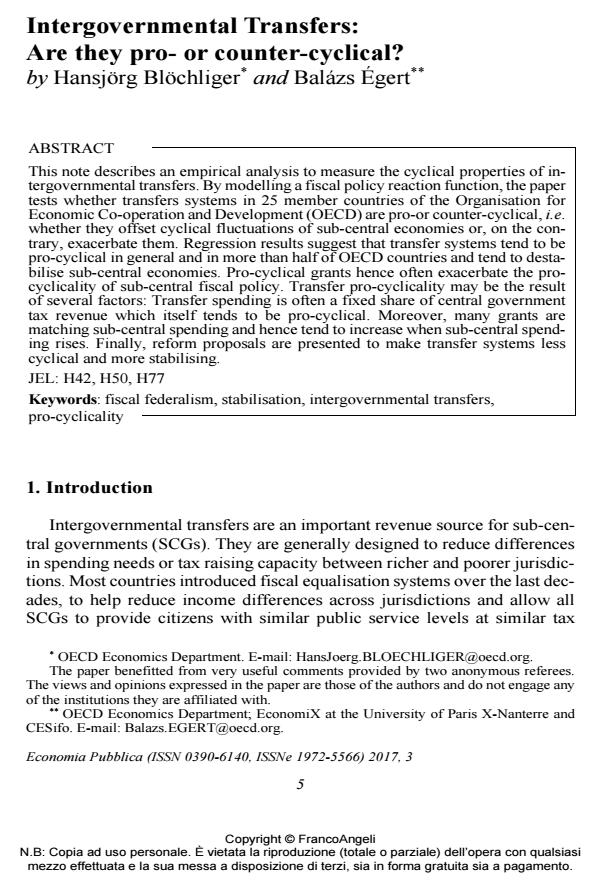Intergovernmental Transfers: Are they pro- or counter-cyclical?
Titolo Rivista ECONOMIA PUBBLICA
Autori/Curatori Hansjörg Blöchliger, Balázs Égert
Anno di pubblicazione 2018 Fascicolo 2017/3
Lingua Inglese Numero pagine 16 P. 5-20 Dimensione file 238 KB
DOI 10.3280/EP2017-003001
Il DOI è il codice a barre della proprietà intellettuale: per saperne di più
clicca qui
Qui sotto puoi vedere in anteprima la prima pagina di questo articolo.
Se questo articolo ti interessa, lo puoi acquistare (e scaricare in formato pdf) seguendo le facili indicazioni per acquistare il download credit. Acquista Download Credits per scaricare questo Articolo in formato PDF

FrancoAngeli è membro della Publishers International Linking Association, Inc (PILA), associazione indipendente e non profit per facilitare (attraverso i servizi tecnologici implementati da CrossRef.org) l’accesso degli studiosi ai contenuti digitali nelle pubblicazioni professionali e scientifiche.
This note describes an empirical analysis to measure the cyclical properties of intergovernmental transfers. By modelling a fiscal policy reaction function, the paper tests whether transfers systems in 25 member countries of the Organisation for Economic Co-operation and Development (OECD) are pro-or counter-cyclical, i.e. whether they offset cyclical fluctuations of sub-central economies or, on the contrary, exacerbate them. Regression results suggest that transfer systems tend to be pro-cyclical in general and in more than half of OECD countries and tend to destabilise sub-central economies. Pro-cyclical grants hence often exacerbate the pro-cyclicality of sub-central fiscal policy. Transfer pro-cyclicality may be the result of several factors: Transfer spending is often a fixed share of central government tax revenue which itself tends to be pro-cyclical. Moreover, many grants are matching sub-central spending and hence tend to increase when sub-central spending rises. Finally, reform proposals are presented to make transfer systems less cyclical and more stabilising.
Parole chiave:Fiscal federalism, stabilisation, intergovernmental transfers, pro-cyclicality
Jel codes:H42, H50, H77
- Redistribution and risk-sharing effects of intergovernmental transfers: an empirical analysis based on Italian municipal data Giampaolo Arachi, Francesco Porcelli, Alberto Zanardi, in Regional Studies /2023 pp.1523
DOI: 10.1080/00343404.2022.2149726
Hansjörg Blöchliger, Balázs Égert, Intergovernmental Transfers: Are they pro- or counter-cyclical? in "ECONOMIA PUBBLICA " 3/2017, pp 5-20, DOI: 10.3280/EP2017-003001